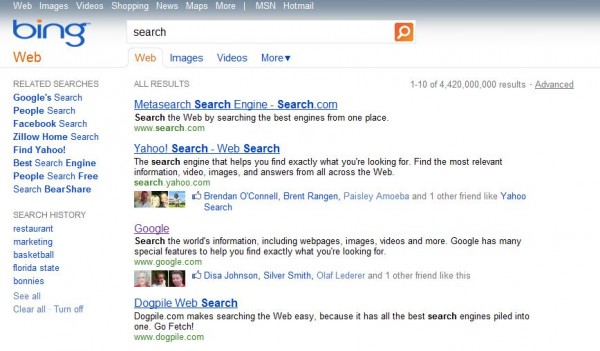How People Power (& Personalize) Bing’s Social Search
The good folks over at Stone Temple Consulting released an in-depth interview with Bing’s Principal Group Program Manager for Bing Social Search, Paul Yiu. The Bing social search team integrates social content and indicators into the search results to add both personalization and relevance to the search results. Bing currently ties in data from both […]

Eric Enge performed the interview for Stone Temple and didn’t pull any punches on social indicators or author authority. Microsoft was surprisingly open with their results, which made for a refreshing read. Some main highlights from the interview were:
Social Indicators
Yiu was straightforward when talking about how Bing did relying on social sites to enhance their results. He stated multiple times that it social is synergistic with search, but not a standalone indicator that will replace search. Yiu gave a great quote when describing Bing’s Social Search:
“So today, the algorithm is flavored by people.”
When describing how people like content that can be seen by others in the search results Yiu also stated:
“We are trying to merge a little bit of the search and browsing intent into one, and have your friends help you navigate the web a little bit better. In a way we are bringing the office water cooler to the search engine.”
Yiu also stressed the importance of fresh content in search results. Being a former member of the Yahoo Search team, it has always been a goal to match fresh content to a user and a query and that is a goal of Bing’s Social Search. This is something that is continually being improved as well. Enge brought up a great example of social search for the New York Post that was showing a few months back that is no longer in place. Yiu pointed to engagement metrics as a reason why social search may change so much. If people aren’t using the results, they are no longer enhancing the product:
“If the content doesn’t earn its spot, its placement gets modified.”
A few other key take aways on social indicators were:
- Friends social data get premium placement
- Friends of friends get special treatment
- Bing holds the maximum number of social enhanced results to three
- Conversations are not currently pulled into the search results
Author Authority
The most fascinating portion of the interview in my mind was Enge’s round of questioning on Author Authority. Always a hot topic, Yiu did a great job of providing answers that should give marketers a big heads up on how to bolster their own authority on social search.
Yiu mentioned that spamming and gaming the system is a min attribute that Bing looks for and that the way people are connected and their networks help to flag spam. He stated:
“We look at the way people are connected, and often we correlate that to the quality of a Tweet. We can also analyze the content the Twitter account links to. What does that mix look like, and how do people interact with the content you are tweeting. That’s just on the Twitter side of things.
On the Facebook side in a way we are still working on it; with Facebook most of the time it’s your true identity. On Facebook right now is just stuff from your friends, so it’s a different problem.”
Other signals that goes into the author authority on Bing are:
- Ratio of followers to following
- Retweets
- Sharing (as a strong indicator than just a like)
- Having good followers
- Following good accounts
- Tweeting about relevant topics
- Authority and Relevance of Retweeters
Contributing authors are invited to create content for Search Engine Land and are chosen for their expertise and contribution to the search community. Our contributors work under the oversight of the editorial staff and contributions are checked for quality and relevance to our readers. The opinions they express are their own.
Related stories
